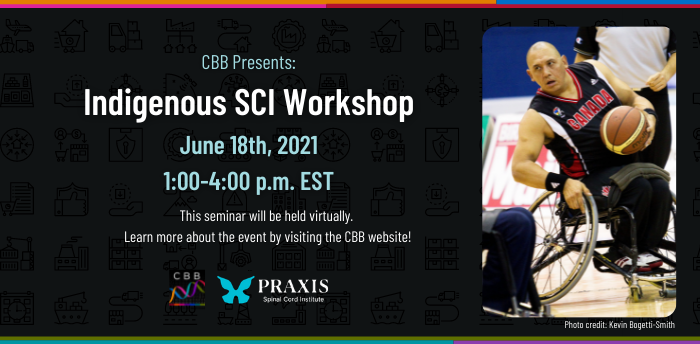
The Centre for Bioengineering and Biotechnology (CBB) in collaboration with Praxis Spinal Cord Institute are thrilled to deliver the Indigenous SCI Grant Competition. The purpose of this program is to address the needs of people with Spinal Cord Injury (SCI) with a focus on engaging Indigenous faculty, students and other stakeholders to develop a deeper understanding of specific challenges faced by people living in rural and indigenous communities. Stage 1 of the program will kickoff with a workshop on June 18, 2021 1 – 4 p.m. The objective of this workshop is to set context for potential competition applicants.
The workshop will feature talks on:
- best practices in research methodology involving Indigenous peoples
- the challenges of those with spinal cord injury, particularly in Indigenous communities
and small breakout rooms to discuss:
- basics of entrepreneurship
- Indigenous identity
- the ideation process
- Q&A on the program
Anyone with research interest in this space can register for the workshop. Teams with at least one member of the University of Waterloo community (Student, Postdoctoral Fellow, Faculty or Staff) are eligible to receive 1 of 8 $2,250 CAD grants to develop their solution. Visualizations will be due July 14, 2021 by 11:59 p.m. – more information on the requirements for these Stage 1 grants will be given during the workshop.
In addition to these Stage 1 awards any workshop participants can further their knowledge by taking The Fundamentals of OCAP course offered by The First Nations Information Governance Centre (FNIGC). The cost for this course will be reimbursed by CBB.
Register for the Indigenous SCI Grant Competition Stage 1 Workshop at the bottom of the page!
Workshop participation is encouraged, but not mandatory for Competition Stage 2 Application (Awards of $17,500 and $10,000). Please see the program site for more information and resources.
Itinerary June 18, 2021
| Time | Session |
|---|---|
| 1:00pm - 1:15pm |
WelcomeSpeakers: Karim S. Karim and Richard Peter |
| 1:15pm - 1:45pm |
Indigenous in researchSpeaker: Melanie Jeffrey |
| 1:45pm - 2:15pm |
Spinal cord injury 101Speakers: Richard Peter and John Chernesky |
| 2:15pm - 2:30pm |
Break |
| 2:30pm - 2:50pm |
Entrepreneurship sessionSpeaker: Jacob Crane |
| 2:50pm - 3:10pm |
Indigenous identity sessionSpeaker: Sara Anderson |
| 3:10 pm - 3:30pm |
Ideation sessionSpeaker: Joseph Ferenbok |
| 3:30pm - 3:50pm |
Program informationSpeaker: Carly Turnbull |
| 3:50pm - 4:00pm |
Closing |







